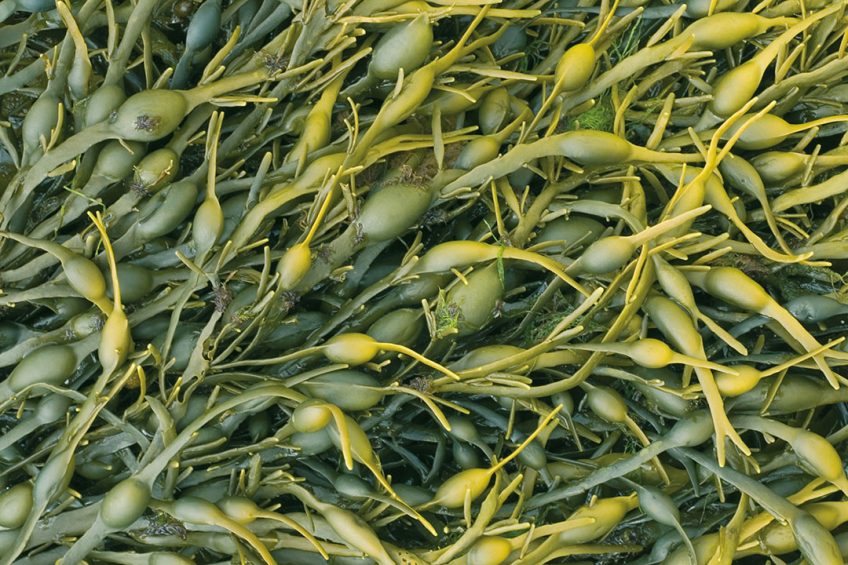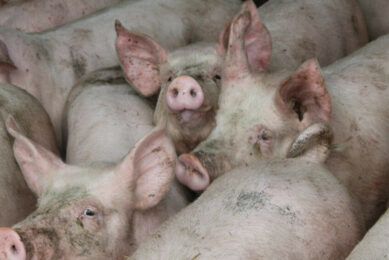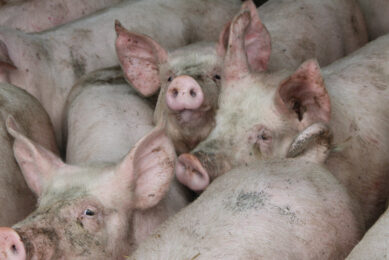From Norway’s fjords into swine troughs

That algae have a lot to offer for pig production is well-known. Less well-known, however, is that benefits also include more intestinal well-being, effective immunostimulation and increased fertility. Those positive effects were found after the administration of algae to swine nutrition.
Seaweeds and brown algae are among the feedstuffs receiving increasing amounts of attention in feed and pig industries. Several scientific studies suggest, however, that the neutraceutical potential of algae is still being widely underused. Within brown algae, there are only a few species currently available for zootechnical use, meeting the requirements of the livestock sector, in terms of a wide availability, high quality standards and obviously cost-compatibility. The Ascophyllum (Ascophyllum nodosum) variety meets those requirements. This seaweed is typical for the cold waters of the Northern Atlantic and naturally proliferates almost as a ‘monoculture’ within the Norwegian fjords.
Characteristics of Ascophyllum
The salient properties of Ascophyllum meal mainly derive from the peculiar composition of the polysaccharide fraction and from the polyphenols, commonly known as phlorotannins or algal tannins. In particular, there are four different types of polysaccharides that are found in Ascophyllum flour. They are:
• Alginates (known to have strong thickening and water retention properties, but also immunostimulation effect as a function of molecular weight);
• Fucoidans (very interesting family of sulphated polysaccharides known in particular for their anti-inflammatory and immunostimulant properties);
• Laminarin (algal β-glucan); and
• Mannitol (a polysaccharide with marked osmotic properties favouring diuresis).
The polyphenols of Ascophyllum are known to be able to influence the course of intestinal fermentations, seemingly in favour of lactobacilli. Recently, several studies on humans seem to indicate that the Ascophyllum phlorotannins are also able to modulate the absorption of carbohydrates by reducing the post-prandial glycemic peak, the excess of which can lead to a real glucose intolerance. It is widely known that – in monogastrics – the vitality of embryos in animals with glucose intolerance is lower than that of animals that do not exhibit this metabolic disorder. Depending on the seasonality of the harvest, the content of polyphenols can vary from 8% to 15%, while the polysaccharide component fluctuates between 40% and 50%.
Two ‘contour’ components of Ascophyllum meal are iodine and glutamate. The last one is the most represented amino acid in the algal protein with an indicative contribution of about 10g/kg of flour. All in all, the mix of components that are naturally present in Ascophyllum flour seems to have been formulated specifically to promote the intestinal well-being of the animals, well-being from which derive an effective immunostimulation, resistance to diseases and an obviously effective absorption of dietary nutrients.

Ascophyllum and swine feeding
There are two ways of using Ascophyllum meal in pig diets: for sows and for weaned piglets. Field tests on sows (Danish Landrace x Large White crossbreeds), conducted in Denmark with the cooperation of Dr Poul Erik Nielsen, Skødstrup, showed that, in a herd of about 900 sows, the use of brown algae meal at a dose of 30g per day throughout the cycle resulted in a substantial improvement in the animals’ fertility. The number of ‘empty’ days per sow reduced drastically from 27 to 11 (see Table 1).
On an annual basis, that has resulted in an increase in the number of deliveries per sow from 2.1 to 2.32. In addition, the number of stillborns fell from 2.1 to 1.8/ sow/ litter. As a result, the productivity of the farm has increased from 31 to 35.3 weaned piglets per sow per year. Interestingly and to the surprise of the breeder, those results were obtained despite the fact that the trial began on July 3. In fact, the animals supplemented with Ascophyllum underwent heat stress during the summer period last year, due to the well-known climatic anomalies, has been extremely marked also in the northern European countries. This fact increases the value of the obtained result since, as is well known, the summer period which normally sees a worsening of the reproductive parameters.
The data shown in Table 1 were obtained in Denmark at the Ødum Engholm farm; in the table the productivity of the second quarter (Q2) of 2018 is compared to that of the two subsequent quarters in which, Ascophyllum meal was introduced into the diet of all sows at the rate of 30g/ animal/ day. At the end of the six-month trial period, the farm manager, Mr Henrik Steen Pedersen, reported another interesting aspect, being the reduction in cases of sudden death of sows attributable to the proliferation of Clostridium novyi. Mr Pedersen said that the reduction of cases of sudden death was enough to justify the cost of introducing Ascophyllum flour.
As far as piglets are concerned, the experience from the last two/ three years suggests that Ascophyllum meal is a raw material that can be used successfully during the weaning phase, allowing the reduction or elimination of the use of zinc oxide. In general, the dose used in weaning is 4-5 kg per tonne of feed.
| Additives and raw materials Prodotti Arca has been active on the market of additives and raw materials for zootechnical use since 2005. For more than ten years it has been representing the Norwegian company Algea in the EU and in the livestock sector. Algea is one of the largest producers of Ascophyllum meal in the world. In addition, the Arca portfolio contains other algae and microalgae as well. The novelties are micro-algae and preparations (Vitalg DHA) with a high content of DHA (Omega 3) of vegetable origin. |











